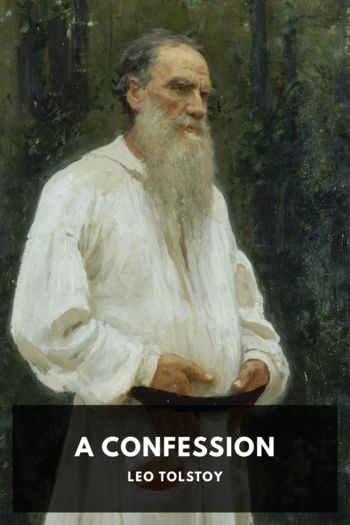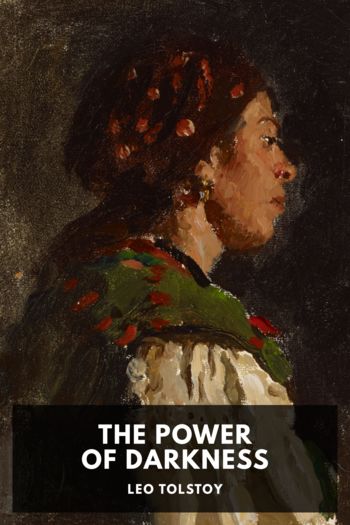Resurrection by Leo Tolstoy (best sci fi novels of all time TXT) 📕

- Author: Leo Tolstoy
Book online «Resurrection by Leo Tolstoy (best sci fi novels of all time TXT) 📕». Author Leo Tolstoy
“Katúsha, why do you speak like that? I know you; I remember you—and the old days in Panóvo.”
“What’s the use of recalling what’s past?” she remarked, drily.
“I am recalling it in order to put it right, to atone for my sin, Katúsha,” and he was going to say that he would marry her, but, meeting her eyes, he read in them something so dreadful, so coarse, so repellent, that he could not go on.
At this moment the visitors began to go. The inspector came up to Nekhlúdoff and said that the time was up.
“Goodbye; I have still much to say to you, but you see it is impossible to do so now,” said Nekhlúdoff, and held out his hand. “I shall come again.”
“I think you have said all.”
She took his hand but did not press it.
“No; I shall try to see you again, somewhere where we can talk, and then I shall tell you what I have to say—something very important.”
“Well, then, come; why not?” she answered, and smiled with that habitual, inviting, and promising smile which she gave to the men whom she wished to please.
“You are more than a sister to me,” said Nekhlúdoff.
“That’s odd,” she said again, and went behind the grating.
XLIVBefore this interview, Nekhlúdoff thought that when she saw him and knew of his intention to serve her, Katúsha would be pleased and touched, and would be Katúsha again; but, to his horror, he found that Katúsha existed no more, and there was Máslova in her place. This astonished and horrified him.
What astonished him most was that Katúsha was not ashamed of her position—not the position of a prisoner (she was ashamed of that), but her position as a prostitute. She seemed satisfied, even proud of it. And, yet, how could it be otherwise? Everybody, in order to be able to act, has to consider his occupation important and good. Therefore, in whatever position a person is, he is certain to form such a view of the life of men in general which will make his occupation seem important and good.
It is usually imagined that a thief, a murderer, a spy, a prostitute, acknowledging his or her profession as evil, is ashamed of it. But the contrary is true. People whom fate and their sin-mistakes have placed in a certain position, however false that position may be, form a view of life in general which makes their position seem good and admissible. In order to keep up their view of life, these people instinctively keep to the circle of those people who share their views of life and their own place in it. This surprises us, where the persons concerned are thieves, bragging about their dexterity, prostitutes vaunting their depravity, or murderers boasting of their cruelty. This surprises us only because the circle, the atmosphere in which these people live, is limited, and we are outside it. But can we not observe the same phenomenon when the rich boast of their wealth, i.e., robbery; the commanders in the army pride themselves on victories, i.e., murder; and those in high places vaunt their power, i.e., violence? We do not see the perversion in the views of life held by these people, only because the circle formed by them is more extensive, and we ourselves are moving inside of it.
And in this manner Máslova had formed her views of life and of her own position. She was a prostitute condemned to Siberia, and yet she had a conception of life which made it possible for her to be satisfied with herself, and even to pride herself on her position before others.
According to this conception the highest good for all men—old, young, schoolboys, generals, educated and uneducated—was sexual intercourse with attractive women; therefore, all men, even when they pretended to be occupied with other things, in reality desired nothing else. She was an attractive woman, and it lay in her power to satisfy or not to satisfy this desire, and therefore, she was an important and necessary person. The whole of her former and present life was a confirmation of the correctness of this conception.
During the last nine years of her life, wherever she found herself, she saw that all men, beginning with Nekhlúdoff and the old police officer, up to the jailers in the prison, all needed her; for she did not observe and took no notice of those men who had no need of her. And therefore all the world seemed to her a collection of people agitated by lust who were trying to get possession of her by all possible means—deception, violence, purchase or cunning. This, then, was how Máslova understood life; and with such a view of life she was by no means the lowest but a very important person. And Máslova prized this view more than anything else; she could not but prize it, for if she lost the importance that such a view of life gave her among men she would lose the meaning of her life. And in order not to lose the meaning of her life, she instinctively clung to the set that looked at life in the same way as she did. Feeling that Nekhlúdoff wanted to lead her out into another world, she resisted him, foreseeing that she would have to lose her place in life, with the self-possession and self-respect it gave her. For this reason she drove from her the recollections of her early youth and her first relations with Nekhlúdoff. These recollections did not correspond with her present conception of the world, and were therefore quite rubbed out of her mind, or, rather, lay somewhere buried and untouched, closed up and plastered over so that they should not escape, as when bees, in order to protect the result of their labour, will sometimes plaster a nest of worms. Therefore, the present Nekhlúdoff was not the man she had once loved with a pure love, but





Comments (0)